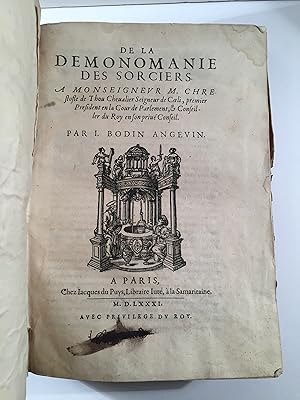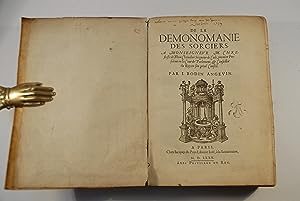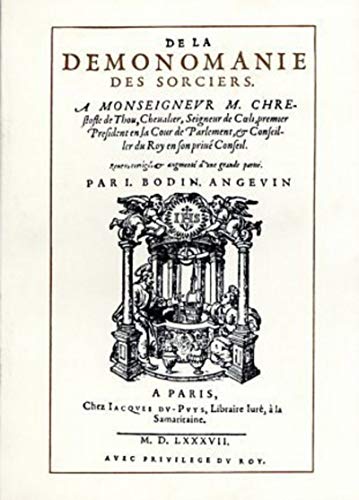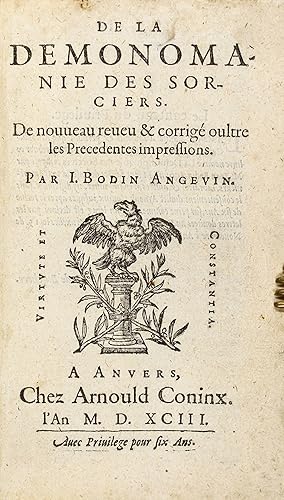Demonomanie des Sorciers (14 Ergebnisse)
Produktart
- Alle Produktarten
- Bücher (14)
- Magazine & Zeitschriften
- Comics
- Noten
- Kunst, Grafik & Poster
- Fotografien
- Karten
-
Manuskripte &
Papierantiquitäten
Zustand
Einband
Weitere Eigenschaften
- Erstausgabe (3)
- Signiert
- Schutzumschlag
- Angebotsfoto (10)
Land des Verkäufers
Verkäuferbewertung
-
DE LA DEMONOMANIE DES SORCIERS
Verlag: DROZ, 2016
ISBN 10: 260001957XISBN 13: 9782600019576
Anbieter: Gallix, Gif sur Yvette, Frankreich
Buch
Zustand: Neuf.
-
De la demonomanie des sorciers
Verlag: Paris, Chez Iaques de Puys Libraire Iuré, a la Samaritaine, 1581
Anbieter: Sokol Books Ltd. ABA ILAB, London, Vereinigtes Königreich
Buch
Hardcover. Zustand: Very Good. 3rd Edition. 4to. ff. [xii] 256. ã4, e4, i4, A-Z4, Aa-Zz4, AAa-SSs4. Roman letter, some Italic and Greek. Du Puy s charming woodcut device on title, floriated and grotesque woodcut and metal-cut initials, woodcut head pieces, large metal-cut tailpiece at colophon, four lines of verse in C18th hand on verso of rear fly, early autograph inked over on t-p. Light age yellowing, small tears on lower outer corner of quire C, original paper flaws, occasional very minor marginal waterstains, marks or spots, tiny worm trail in lower blank margin of quires A and B. A very good copy in contemporary limp vellum, with good margins (some deckle edges in lower margin) yapp edges, remains of ties, vellum a little stained, small hole in spine. Rare third edition (often misdescribed as second), published a year after the first, of this important, fascinating and most influential treatise on witches by Jean Bodin, which went through five editions by Jaques Du Puy by 1582. Jean Bodin s On the Demon-Mania of Witches (De la démonomanie des sorciers) appeared in 1580 and rapidly became a major publishing success. It underwent at least twenty-three editions and was translated from its original French into German, Italian and Latin. It was surely the most published work of the era on the subject of demons and witches. Because of its wide distribution, it has been considered by generations of historians to have been an extremely influential book, responsible in itself for large-scale prosecutions of witches in the four or five decades following its appearance. Jonathan L. Pearl,. On the Demon-mania of Witches Jean Bodin attained eminence as a political philosopher, economist and advocate of religious toleration, and was regarded by most contemporaries as a sceptic or even an atheist, yet he retained an abiding belief in sorcery, astrology and other superstitions. In this work he denounces all who disbelieve in witchcraft and calls for the burning of witches and wizards, although he implies that he himself had for 13 years been guided by a friendly demon who touched one or other of his ears whenever he intended to do right or wrong. He records a number of pacts made with the Devil, as well as alleged sexual relations with lesser demons, and asserts that witches are transported through the air, that demons assume human form, and that men are transformed into animals. He believes in lycanthropy or werwolves and in the marks of sorcerers. In their professed cures they employ unnatural remedies and poisons like the brain of a cat or head of a raven. Really the only maladies which they can cure are those which they have inflicted, and in this case they must pass the ailment on to someone else . (Thorndike VI 526). In his many works, Bodin, influenced by Renaissance syncretism and shaken by the extreme violence of his time, was very tolerant of varieties of religious belief. While he generally supported a Catholic settlement of the conflicts, he was far from being an orthodox believer. Generations of scholars have admired the Commonwealth as the first modern study of the state and have often depicted Bodin as a modern man. . But many of these scholars have been shocked and perplexed at the apparent contrast between the modern , rational political Bodin, the tolerant religious Bodin, and the intolerant and superstitious Bodin of the Demon-Mania. There is a long tradition among Bodin specialists of either ignoring the Demon-Mania or treating it as a bizarre aberration in an otherwise respectable progressive intellectual. . in fact the Demon-mania shares essential points of view and concerns with the Commonwealth and the Colloquium . Jonathan L. Pearl. A very good copy of this important work. USTC. 5913. Index Aurel. 120.819. BM. STC. Fr. C16th p. 72. Thorndike VI 526. Brunet I 1025: "ce dernier ouvrage a eu une grande vogue dans le temps". Caillet 1269.
-
De la demonomanie des sorciers
Verlag: Paris, Chez Iaques de Puys Libraire Iuré, a la Samaritaine, 1580
Anbieter: Sokol Books Ltd. ABA ILAB, London, Vereinigtes Königreich
Buch Erstausgabe
Hardcover. Zustand: Very Good. 1st Edition. FIRST EDITION. 4to. [xiv], 252 (i.e. 256). ã4, e4, i4, õ2, A-Z4, Aa-Zz4, AAa-SSs4. Roman letter, some Italic and Greek. Du Puy s charming woodcut device on title, floriated and grotesque woodcut and metal-cut initials, woodcut head pieces, ex libris Pauli Augusti le Chevalier on recto of last with two pages of manuscript notes on the following blank leaves and on rear pastedown, purchase note dated 1739 (exchanged for several books) at head of title page in his hand, a few annotations and underlinings in the same hand, early monogram stamped on blank margin of title. Light age yellowing, light damp stain on last few leaves and quire DDd. A very good copy in contemporary limp vellum, yapp edges, spine covered in calf c.1700, gilt ruled in compartments, tan morocco label gilt, vellum speckled at the same time, Ex dono De A Lechevalier gilt stamped on upper cover, remains of ties. Rare first edition of this important, fascinating and most influential treatise. Jean Bodin s On the Demon-Mania of Witches (De la démonomanie des sorciers) appeared in 1580 and rapidly became a major publishing success. It underwent at least twenty-three editions and was translated from its original French into German, Italian and Latin. It was surely the most published work of the era on the subject of demons and witches. Because of its wide distribution, it has been considered by generations of historians to have been an extremely influential book, responsible in itself for large-scale prosecutions of witches in the four or five decades following its appearance. Jonathan L. Pearl,. On the Demon-mania of Witches Jean Bodin attained eminence as a political philosopher, economist and advocate of religious toleration, and was regarded by most contemporaries as a sceptic or even an atheist, yet he retained an abiding belief in sorcery, astrology and other superstitions. In this work he denounces all who disbelieve in witchcraft and calls for the burning of witches and wizards, although he implies that he himself had for 13 years been guided by a friendly demon who touched one or other of his ears whenever he intended to do right or wrong. He records a number of pacts made with the Devil, as well as alleged sexual relations with lesser demons, and asserts that witches are transported through the air, that demons assume human form, and that men are transformed into animals. He believes in lycanthropy or werwolves and in the marks of sorcerers. In their professed cures they employ unnatural remedies and poisons like the brain of a cat or head of a raven. Really the only maladies which they can cure are those which they have inflicted, and in this case they must pass the ailment on to someone else . (Thorndike VI 526). In his many works, Bodin, influenced by Renaissance syncretism and shaken by the extreme violence of his time, was very tolerant of varieties of religious belief. While he generally supported a Catholic settlement of the conflicts, he was far from being an orthodox believer. Generations of scholars have admired the Commonwealth as the first modern study of the state and have often depicted Bodin as a modern man. . But many of these scholars have been shocked and perplexed at the apparent contrast between the modern , rational political Bodin, the tolerant religious Bodin, and the intolerant and superstitious Bodin of the Demon-Mania. Jonathan L. Pearl. The work has interesting provenance having belonged to the Rouen Lawyer and historian, Auguste Le Chevalier; the C19th historian Albert Sarrazin published a biography based on his correspondence in 1876. The work contains two pages of his notes on witch trials in Rouen in the C16th. A very good copy of the very rare first edition. USTC. 1660. Thorndike VI 526. Index Aurel. 120.816. BM. STC. Fr. C16th p. 72. Brunet I 1025: \"ce dernier ouvrage a eu une grande vogue dans le temps\". Caillet 1269.
-
Paris, J. du Puys, 1580. 4to. Contemporary full vellum wih contemporary handwritten title to spine. Binding somewhat warped, but unrestored and tight. A (mostly very faint) damp stain to upper blak margin of some leaves (not affecting text), but otherwise internally very nice clean and fresh. Old owner's name to title-page (Dufault) and old acquisition note to front free end-paper. Woodcut title-vignette, woodcut headpieces, woodcut end-vignette, and a few woodcut initials. A large copy with good margins. (14), 252 (recte: 256) ff. Scarce first edition of Bodin's seminal "Demon-Mania", the most important book on witchcraft of the era. The work profoundly influenced the position on witchcraft of the following half century and directly influenced the course of witch trials of this period. The work is furthermore of fundamental importance to the understanding of Bodin's tripartite world picture and constitutes an invaluable supplement to his "Six livres de la république"."Jean Bodin's "On the Demon-Mania of Witches" (De la démonomanie des sorciers) appeared in 1580 and rapidly became a major publishing success. It underwent at least twenty-three editions and was translated from its original French into German, Italian and Latin. It was surely the most published work of the era on the subject of demons and witches. Because of its wide distribution, it has been considered by generations of historians to have been an extremely influential book, responsible in itself for large-scale prosecutions of witches in the four or five decades following its appearance." (Pearl, p. 9).The present first edition constitutes not only the original version of the work, but also the model for all French editions that followed (as well as the later translations) - as many as 11 between 1581 and 1616. Bodin edited an edition in 1587, which contained some additions" that edition is considered very flawed, however, and no subsequent editions were based upon it. Jean Bodin (1529/30 - 1596), "one of the towering figures in the history of French thought" (Scott), was a lawyer, economist, natural philosopher, historian, and one of the major political theorists of the sixteenth century. His main work, the "Six livres de la république" is one of the most important works of modern political thought. Here Bodin gave the first systematic statement of sovereignty and coined the term "political science". With his theory of the State and statement of Sovereignty, he fundamentally changed the history of political thought in the West. The "Six livres de la république" is Bodin's most famous and frequently read work. Due to the seemingly "supernatural" contents of the "Démonomanie", scholars have had difficulties recognizing the Bodin of the "Six livres" in this work, which, within its domain, was just as influential. There has been, however, increasing recognition of the political contents of the "Démonomanie", and a tendency towards reconciliation of the great works by this towering figure of early modern French thought. First of all, the work is written with the same impressive thoroughness and style as Bodin's other works. Second, although based upon a concrete sorcery case, the "Démonomanie" is of the utmost importance to the understanding of Bodin's tripartite world picture and his attempts at maintaining a clear line of separation between the world of nature and the supernatural. His monumental conception of "Theatrum Naturae" is just as dominant as a thematical background in his "Démonomanie" as it is in his "Six livres" and there ought to be no doubt about the fact that the basic features of his system of thought are dominant in the present work, which due to its concrete matter of investigation is all the more interesting. In fact, the "Démonomanie" is now considered an invaluable source for the general thought of the great political thinker. With its two-fold turn of focus on social problems and questions of natural-philosophical and theological character, the "Démonomanie", in accordance with Bodin's scientific plan of life, marks the transition from "human sciences" to "the science of natural and divine things". "Contrary to the judgment of the Enlightenment thinkers, this midway-position does not reduce its value in the Bodin corpus" on the contrary: Precisely this work is suitable for clarifying and illustrating the unity of his works." (Own translation from the German. Lange, p. 162). Concerning himself with witchcraft and demonology, it is in this work that we find an emphasized statement of Bodin's thoughts on women, on punishing and sentencing, and on the general threats of state and society. Having experienced severe criticism of his earlier works, Bodin's critics became more serious and dangerous with regard to his "Démonimanie". In his letter of dedication (December 20, 1579) to Christophle de Thou, the first president of the Parlement of Paris, Bodin explained his motives for writing the work. "First, he hoped to denounce the mania, the spiritual errors, and distraction, as well as the "fury" that sorcerers possess as they "chase after the devil." He wrote this treaty with two purposes in mind: on the one hand, "to use it as a warning to all who will see him [the devil]," and on the other hand, "to alert readers that there is no crime that could be more atrocious or deserve more serious punishment." Bodin wished to speak out against those who "try by all means to rescue the sorcerers through printed books." He reminded all that "Satan has men in his grasp who write, publish, and speak claiming that nothing that is said about sorcerers is true." It was essential to provide the tools to magistrates and judges, who were confronted by the accused sorcerers, in order to face this formidable problem. The work was bold and perilous for its author. Many wondered if Bodin, so curious about this topic, such an expert, so convinced of the devil's existence, may not himself have been involved with witchcraft. These sus.
-
De la démonomanie des sorciers
Verlag: GUTEMBERG, 1992
ISBN 10: 2865540448ISBN 13: 9782865540440
Anbieter: Gallix, Gif sur Yvette, Frankreich
Buch
Zustand: Neuf.
-
De la démonomanie des sorciers :
Verlag: Hildesheim/Zürich/New York, Georg Olms Verlag, 1988
ISBN 10: 3487079313ISBN 13: 9783487079318
Anbieter: Versand-Antiquariat Konrad von Agris e.K., Aachen, Deutschland
Buch
8°, Leinen. Zustand: Sehr gut. 252 Seiten : Schmutztitel mit Besitzereintrag, sonst fast wie neu ISBN: 9783487079318 . Als Versandart wählen wir immer eine schnelle Option (in Deutschland Brief oder DHL-Paket, ins Ausland Warenpost oder DHL-Paket). Preis inkl. MwSt. Sprache: Französisch Gewicht in Gramm: 607.
-
De la Démonomanie des sorciers.
Verlag: Anvers, Arnould Coninx., 1593
Anbieter: Antiquariat Peter Fritzen, Speicher, Deutschland
De nouveau rev. et corr. oultre les précédentes impressions. 18 x 11 cm. 467 Seiten. Mit wiederholter Holzschnitt-Druckermarke auf Titel und letztem Blatt. Ganzpergament mit handschriftlichem Rückentitel. Teilweise etwas stockfleckig. Einriss mit Textverlust auf S. 19 (Kopie anbei). Späterer Einband (Remboitage??). Coumont, Demonology and witchcraft B 87.9 (Eight editon, second printing). Belgica typographica 5287. Index Aurel. 120.847. Machiels, Gent B777. Caillet 1270 (Keerberghe). Bibliotheca esoterica 387ff. (andere Ausgaben). Im selben Jahr erschien eine ebenfalls von Coninx gedruckte Ausgabe bei Keerberghe die, im Gegensatz zu vorliegender, in Wolfenbüttel und Berlin nachgewiesen ist (Coumont B87.10). Erstmals 1580 in Paris erschienen, erste lateinische Ausgabe Basel 1581. Hauptwerk des französischen Philosophen und Staatsrechtlers Jean Bodin (1529/30-1596), vor allem wegen seiner bedeutenden staatstheoretischen Schriften bekannt. Er nahm als Jurist an einigen Hexenprozessen teil, führte selbst den Prozess gegen Johanna Harwilerin im Jahr 1579 und war in der Folge einer der heftigsten und maßgeblichsten Befürworter der Hexenverfolgungen. Seine Démonomanie Des Sorciers ("De Magorum Daemonomania") wurde zu einem wichtigen Nachschlagewerk und Handbuch bei Gerichtsprozessen. Bodin zitiert zahlreiche antike und zeitgenössische Autoren und liefert eine ausführliche Zusammenfassung des Zauber-, Hexen- und Dämonenglaubens seiner Zeit. Ein grosser Teil des Buches (S. 403-467) besteht aus einer massiven Gegenrede auf dem Arzt Johann Weyer "Refutatuion des opinions de Iean VVier". Dieser hatte als Ursache der meisten Fälle von Hexerei eher kriminelle Berechnung oder krankhafte Melancholie ausgemacht und sich damit gegen den Hexenwahn gewendet. Bodin est un véritable reflet de son temps: il croit aux pactes faits avec les démons, à l'évocation des morts et à la copulation charnelle avec les démons. Il ridiculise les arguments juridiques de Jean Wier et réfute ses opinions que les sorciers sont le plus souvent des malades ou des fous et qu'il ne fallait pas les brûler. Lui, au contraire, exprime le désir de réunir des centaines de sorciers et sorcières pour pouvoir lui-même les griller en un seul tas. L'édition originale date de Paris, 1580. Marque de l'imprimeur en bois sur le titre et sur la dernière page. Rousseurs, Déchirure avec perte de texte à la p. 19/20 (copie). Reliure postérieure (moderne?).
-
De la Demonomanie des Sorciers. A Monseigneur M. Chrestofle de Thou, Chevalier Seigneur de Coeli, premier President en la Cour de Parlement, & Conseiller du Roy en son privé Conseil.
Anbieter: Antiquariaat Wim de Goeij, Kalmthout, ANTW, Belgien
Verbandsmitglied: ILAB
Paris, chez Jacques du Puys, 1582, in-4°, (28) nn pp + 252 pp (complete). Bound in old supple vellum, (binding a bit soiled and with some minor traces of use). Title page with a small hole in the title vignet. The lost paper sticks on the opposite (blank) fly leaf ( a paper restorer should be able to put it back), Interior fine, notwithstanding some faint waterstains at some pages and a worming gallery in the lower margin of some pages (never reaching the text). Still a fine.good copy. With an engraved armorial ex-libris (18th c., not identified) and a manuscript ex-libris on the recto of the title ''Simon Castoris''. This is the fourth edition. ( See Crahay, Isaac, Lenger ; Bibliographie critique des éditions anciennes de Jean Bodin-Bruxelles 1991. pp. 228-229. Edition F4 ) This horrible text where cruelty disputes with credulity reflects the author's terror and panic when observing his country devastated by war. God has abandoned France. The Demon has taken over.
-
De la demonomanie des sorciers. A Monseigneur M. Chrestofle de Thou Chevalier Seigneur de Coeli, premier President en la Cour de Parlement, & Consiller du Roy en son priué Conseil.
Verlag: Paris: Jacques Du Puis, 1580, 1580
Anbieter: Peter Harrington. ABA/ ILAB., London, Vereinigtes Königreich
Erstausgabe
First edition of the most influential witch-hunting guide of the 16th century. This work "brought witchcraft into the new era, supplanting the Scholastic Malleus maleficarum as the go-to manual for understanding and prosecuting witchcraft" (Krause, p. 119). De la demonomanie des sorciers ("On the Demon-Mania of Witches") originates from Bodin's interest in witchcraft as a lawyer. One of the greatest legal minds of his era, he became involved in witch trials while working as prosecutor for the King in north-eastern France. The treatise is divided into four books. The first contains one of the earliest attempts at a legal definition of a witch: "One who knowing God's law tries to bring about some act through an agreement with the devil" (p. 1). The other books respectively deal with magic in general, the means to prevent spells, and the investigation and trial of witches. "Bodin asserts that witches are transported through the air, that demons assume human form, and that men are transformed into animals. He believes in lycanthropy or werwolves and in the marks of sorcerers. In their professed cures they employ unnatural remedies and poisons like the brain of a cat or head of a raven" (Thorndike, p. 526). The book also includes reports of exorcisms and famous trial cases. At the end, Bodin attacks the prominent Dutch demonologist Johann Weyer, who had stated - in his De praestigiis daemonum (1563) - that so-called witches were just women suffering from mental illness. The book was a Renaissance best-seller and the most widely read work on demonology of the period: it went through 23 editions and was translated from the original French into German, Italian, and Latin. It "exercised tremendous influence over the judges who heard witchcraft cases and was the direct cause of a considerable increase in the number of trials and executions for witchcraft following its appearance and wide dissemination" (Pearl, p. 112). Caillet 1269. Virginia Krause, "The will to know and the unknowable. Jean Bodin's De La Démonomanie", in The Science of Demons, 2020; Jonathan L. Pearl, The Crime of Crimes: Demonology and Politics in France, 1560-1620, 2006; Lynn Thorndike, A History of Magic and Experimental Science, Vol. VI, 1966. Quarto (206 x 140 mm). 17th-century speckled calf, spine with raised bands, floral gilt decoration in compartments, red morocco label, board edges tooled in gilt, 19th-century marbled endpapers, edges speckled red. Partially removed bookplate of Victor Duchâtaux (1823-1905), dated 1887, on front pastedown; Duchatâux was a lawyer and member of the municipal council at Reims. Later ownership stamp of the Jesuit college of Enghien, Belgium, on verso of title page. Spine, corners, and inner hinges discreetly repaired, upper margins sometime shaved touching text on a couple of leaves, damp stain to upper corner of 3 final gatherings, consequent loss of paper to corners of last 4 leaves (affecting a couple of letters on last leaf), final leaf pasted onto final blank, with early ownership inscriptions (including "Ex libris Michaelis") still partially visible. A very good copy, presenting well.
-
La Démonomanie Des Sorciers (Éd.1598)
Verlag: HACHETTE LIVRE, 2012
ISBN 10: 2012559824ISBN 13: 9782012559820
Anbieter: moluna, Greven, Deutschland
Buch
Zustand: New. KlappentextWORK IS IN FRENCH This book is a reproduction of a work published before 1920 and is part of a collection of books reprinted and edited by Hachette Livre, in the framework of a partnership with the National Library of France, .
-
De la démonomanie des sorciers (French Edition)
Verlag: Legare Street Press, 2022
ISBN 10: 1015493041ISBN 13: 9781015493049
Anbieter: moluna, Greven, Deutschland
Buch
Kartoniert / Broschiert. Zustand: New.
-
1.: Les éditions anciennes de la République de Bodin conservées dans les bibliothèques belges. 2.: Les éditions anciennes de la Demonomanie des sorciers de Bodin conservées dans les bibliothèques belges. 3: L'édition de Paris 1598 de la Démonomanie des sorciers de Bodin. 4.: Les éditions anciennes de Bodin dans la bibliothèque de Charles van Hulthem.
Verlag: Bruxelles, Emile Van Balberghe, 1983-1988., 1988
Anbieter: Emile Kerssemakers ILAB, Heerlen, Niederlande
4 vols. 8vo (23,5 x 16 cm. Resp. 52, 52, 26 and 66 pp. With illustrations, mainly facsimiles of title-pages. "Documenta et Opuscula 2, 3, 4 and 9" - All the titles of Marie-Thérèse Lenger published in this series. - As new, 3 titles with autograph dedication of the author 500g.
-
Der Teufel, die Hexe und der Rechtsgelehrte. Crimen magiae und Hexenprozesse in Jean Bodins "De la Démonomanie des Sorciers" (Studien z. europ. Rechtsgeschichte; Bd. 318).
Verlag: Frankfurt a. M., Vittorio Klostermann,, 2020
ISBN 10: 3465043898ISBN 13: 9783465043898
Anbieter: Antiquariat Logos, München, Deutschland
Buch
Gr.-8°, Brosch. XVI, 390 S. Neuwertiges Ex. / Fine Copy // "De la Démonomanie des Sorciers" (1580) ist nicht das berühmteste, wohl aber das kontroverseste Werk des großen französischen Staatstheoretikers Jean Bodin (1529-1596). Darin erörtert er die Natur des Hexenwesens und gibt eine Anleitung zur rigiden strafrechtlichen Verfolgung des crimen magiae. Obgleich ein genuin juristisches Werk, wurde der Text bisher gerade aus rechtlicher und rechtshistorischer Perspektive nicht eingehend erforscht. Die Studie geht der Frage nach der Funktion und Bedeutung rechtlicher Normativität in Bodins Hexenmanual nach. Dabei zeigt sie die Verbindung von Bodins Weltbild und seinen Rechtsvorstellungen auf, legt die Ausgestaltung des Hexereitatbestands in seinen einzelnen Deliktselementen dar und erklärt das prozessuale Sonderrecht gegen Hexen. ISBN: 9783465043898 Sprache: Deutsch Gewicht in Gramm: 649.
Mehr Angebote von anderen Verkäufern bei ZVAB
Neu ab EUR 69,00
Gebraucht ab EUR 69,00
Mehr entdecken Softcover





![Bild des Verkäufers für De la demonomanie des sorciers. - [THE MOST IMPORTANT BOOK ON WITCHCRAFT OF THE ERA] zum Verkauf von Lynge & Søn ILAB-ABF](https://pictures.abebooks.com/inventory/md/md22188964705.jpg)








